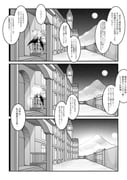Interesting, the Japanese word for "watermelon" ("スイカ" / "suika") is commonly written in katakana (as are most plants and animals in modern Japanese), so you nornally just get the pronunciation when reading it. That's how it's written here.
"Sui"/"水" is the common Chinese derived pronunciation for "water" in most compound words, and "ka"/"瓜" means "melon". As a result, in my mind, I always figured it was just "水瓜" / "watermelon" just like it is in English.
Thinking that way made the fact that the artist explicitly pointed out the English etymology in the post here as trivia seem a little weird to me, since it wouldn't be that interesting if it just matched the Japanese etymology.
Apparently, "水瓜" is a possible alternative kanji spelling in Japanese, but its rare, and the original / preferred / more proper kanji spelling is "西瓜" meaning "western melon" which has the same pronunciation.






















